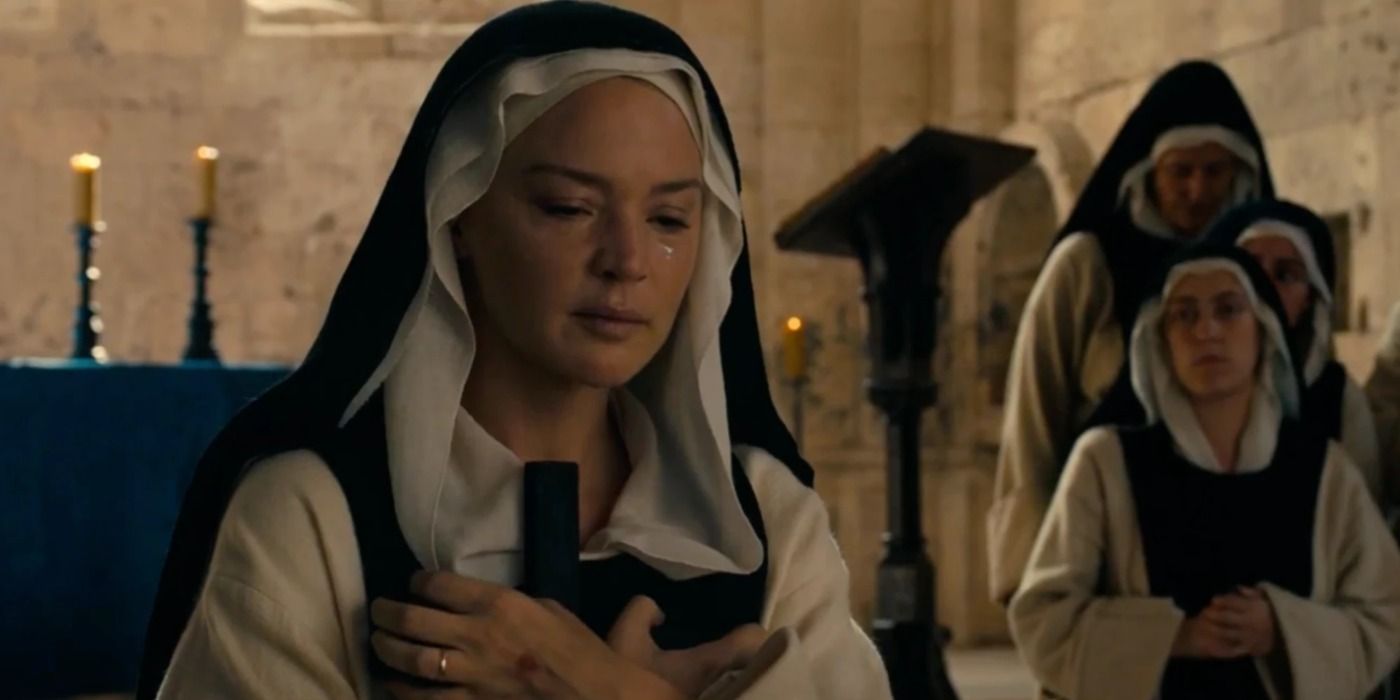Benedetta (France/Belgium/Netherlands, 2021)
December 08, 2021
Deep within the cloistered confines of a convent, a young nun becomes embroiled in an intensely erotic lesbian affair while using her wiles to advance and maintain her position. While this might easily be the synopsis of a porn movie, octogenarian director Paul Verhoeven has used it as an opportunity to skewer aspects of religion in Renaissance Italy, tell a lurid story about the politicking and backstabbing within the Church, and (of course) not skimp on the exploitation elements inherent in the narrative. In essence, it’s exactly what one would expect from Verhoeven given the premise.
If you come to Benedetta for the flesh, you won’t be disappointed. Verhoeven delivers without compunction (although his decision to hire a female cinematographer, Jeanne Lapoirier, who has worked with the likes of Luc Besson and Francois Ozon, might be seen as an attempt to counterbalance the so-called “male gaze”). But, as has always been the case with Verhoeven except in his most commercial endeavors (Basic Instinct and Showgirls), there’s more going on here than first meets the eye. Verhoeven isn’t as ruthless as some directors when eviscerating mid-millennium Catholicism but his knives are out. He illustrates that living and advancing in cloistered life is less a matter of true belief than it is of “playing the game,” as Sister Felicita (Charlotte Rampling) puts it.
The story focuses on Sister Benedetta (Virginie Efira, who also worked with Verhoeven in his previous feature, Elle), a nun in residence in a Northern Italian convent during the early 1600s. (The character is based on an real person whose tale is told in Judith C. Brown’s Immodest Acts, which forms the basis of the screenplay.) Due to the appearance of stigmata, she is venerated and elevated by the Church to the position of abbess, replacing the long-time Mother Superior, Sister Felicita. This creates a division of loyalty not only in the convent but in the Church hierarchy. Meanwhile, Benedetta enters into a lesbian relationship with a novice, Bartolomea (Daphne Patakia). When one of Felicita’s adherents, Sister Christina (Louise Chevillotte), speaks out against Benedetta, calling her a fraud, she is slapped down hard by a priest and commits suicide. This provokes Felicita to go to Florence to seek Benedetta’s removal and execution. But the city is gripped by the plague and anyone traveling there is subject to catching the dangerous virus.
 Arguably the most interesting aspect of the film is that
they way Verhoeven portrays events, we’re never sure whether Benedetta is a
deeply devout woman who genuinely speaks for the Lord and whose marking (to the
hands, feet, side, and crown of the head) are divine or whether she’s a clever
con artist whose goals are power and the freedom to indulge in sexual excess.
Both the director and actress Virginie Efira move along an ambiguous path that
invites either interpretation and at no point is a definitive resolution
provided. As a result, we’re never sure whether Benedetta is a deeply wronged
victim or a devious anti-heroine.
Arguably the most interesting aspect of the film is that
they way Verhoeven portrays events, we’re never sure whether Benedetta is a
deeply devout woman who genuinely speaks for the Lord and whose marking (to the
hands, feet, side, and crown of the head) are divine or whether she’s a clever
con artist whose goals are power and the freedom to indulge in sexual excess.
Both the director and actress Virginie Efira move along an ambiguous path that
invites either interpretation and at no point is a definitive resolution
provided. As a result, we’re never sure whether Benedetta is a deeply wronged
victim or a devious anti-heroine.
Verhoeven doesn’t skimp when it comes to showing the darker aspects of the Church. The nuncio (played by Lambert Wilson at his smarmiest) apparently has a pregnant mistress who serves him at dinner. His “loving” solution to uncovering Benedetta’s sapphic sins is to torture her lover (and, although the actual process isn’t shown – thankfully – there’s little left to the imagination once we’re given a demonstration of how the torture instrument works). It’s evident that little about convent life is related to spirituality. It’s about power, money, prestige, and carving out as much freedom as is possible within the cloistered confines. Benedetta’s first orgasm is a moment of transformation for her, occurring long after she is warned that “Your worst enemy is your body.”
 Efrina offers a courageous and committed performance; she’s
up to the ambiguities inherent in her role and doesn’t shy away from the full-frontal
nudity. In some scenes, her interpretation comes across as a true believer
being used as an agent of the Jesus who appears to her in lurid visions. In
others, she’s like a teenager given her first taste of freedom, as when Benedetta
and Bartolomea “luxuriate” in the abbess’ quarters. Charlotte Rampling is ice
to Efrina’s fire; the actress is at her cool best, confounding expectations of
the stereotype. Daphne Patakia is a little raw and, as a result, her performance
is uneven, but she displays the requisite chemistry with Efrina for their
affair to work and for the reversal of the power dynamic (the novice is the sexual
dominant) to be believable.
Efrina offers a courageous and committed performance; she’s
up to the ambiguities inherent in her role and doesn’t shy away from the full-frontal
nudity. In some scenes, her interpretation comes across as a true believer
being used as an agent of the Jesus who appears to her in lurid visions. In
others, she’s like a teenager given her first taste of freedom, as when Benedetta
and Bartolomea “luxuriate” in the abbess’ quarters. Charlotte Rampling is ice
to Efrina’s fire; the actress is at her cool best, confounding expectations of
the stereotype. Daphne Patakia is a little raw and, as a result, her performance
is uneven, but she displays the requisite chemistry with Efrina for their
affair to work and for the reversal of the power dynamic (the novice is the sexual
dominant) to be believable.
The movie took three years to reach screens; filming was completed pre-pandemic in 2018. In the interim, a health issue delayed Verhoeven’s post-production work and, by the time the production was done, COVID forced a delay. Benedetta premiered at the 2021 Cannes film festival where it was well-received. It is Verhoeven through-and-through. Now in his 80s, the filmmaker remains unapologetic about his approach, although there’s a lot more to this production than its exploitative elements. Fascinating, garish, and compelling even with an overlong 130-odd minute running time, Benedetta dabbles in some of Verhoeven’s career-long weaknesses while highlighting a great many of his strengths.
Benedetta (France/Belgium/Netherlands, 2021)
Cast: Virginie Efira, Charlotte Rampling, Daphne Patakia, Lambert Wilson, Olivier Rabourdin, Louise Chevillotte
Home Release Date: 2022-06-14
Screenplay: David Birke & Paul Verhoeven, based on the book “Immodest Acts” by Judith C. Brown
Cinematography: Jeanne Lapoirier
Music: Anne Dudley
U.S. Distributor: IFC Films
U.S. Release Date: 2021-12-03
MPAA Rating: "R" (Sexual Content, Disturbing Images, Nudity)
Genre: Thriller
Subtitles: In French with subtitles
Theatrical Aspect Ratio: 2.35:1
- (There are no more better movies of Virginie Efira)
- (There are no more worst movies of Virginie Efira)
- (There are no more better movies of Daphne Patakia)
- (There are no more worst movies of Daphne Patakia)

Comments